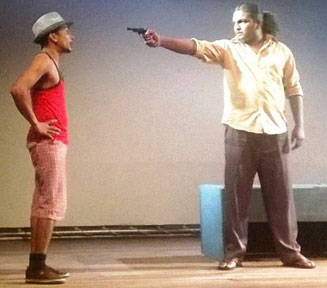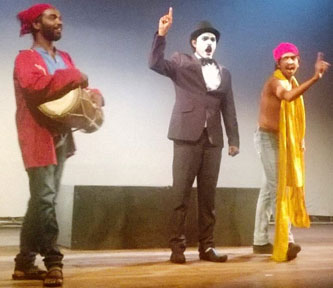|
 A praiseworthy trio of short plays
Laughter and
introspection
in every line A praiseworthy trio of short plays
Laughter and
introspection
in every line
by Dilshan Boange
Young playwright, director, and actor, Krishantha Jayabahu, presented, to the
delight of theatregoers a trio of Sinhala short plays on the boards of the
Punchi Theatre, on June 10. The titles of the plays, in the order they were
staged that evening, are - Chaplin, Ai Aulda? (Why, Are You Upset?) and Mama
Bahinne Nehe (I Will Not Come Down). It was heartening to see a commendable
mettle of originality forming the substance of the short plays in respect of
what they offered as story lines and scenarios, and the deeper vein of thought
that lies within the base of creativity of the works.
 In Chaplin, the predicament of two aspiring young actors commissioned to put on
a puppet show at a village temple is brought out in a scenario that brings about
laughter and moments of introspection, when the two young men improvise as best
they can, with a robot that looks like Charlie Chaplin, that repeats what is
spoken to it, except that it does not utter a lie. The short play brought out
the theme, how youth pursue dreams of stardom through acting, but face harsh
penury, and realize that the path to stardom is paved with anything but rose
petals. In Chaplin, the predicament of two aspiring young actors commissioned to put on
a puppet show at a village temple is brought out in a scenario that brings about
laughter and moments of introspection, when the two young men improvise as best
they can, with a robot that looks like Charlie Chaplin, that repeats what is
spoken to it, except that it does not utter a lie. The short play brought out
the theme, how youth pursue dreams of stardom through acting, but face harsh
penury, and realize that the path to stardom is paved with anything but rose
petals.
The grievances of the young man from a village in the hill country, were that he
had risked much of his family’s reputation in the venture of the puppet show,
while to his colleague, who is of a lesser privileged segment in the city, the
stakes don’t seem that high on the loss of personal reputation, if the show goes
awry. A striking note of contemporary social criticism in the text was, how one
of the characters expresses frustration over how the acting course they followed
at the Tower Hall theatre seems to have duped them, since none of their teachers
ever told them how poor the prospects would be to earn a living as an actor. The
price of pursuing dreams of celebrity status and stardom in Sri Lanka, the
predicaments dogging youth who venture into finding their fortune as artistes,
thus come out in Chaplin.
When grappling with the robot that utters various statements of sound political
realities affecting people today, one of the striking remarks made by one of the
two is, ‘what is needed to talk politics is not allegiance to a party but a
conscience’. Ironically, the character that was not meant to be ‘live’ or ‘real’
seemed to possess the boldness of speaking conscientiously within that context.
The second play, provided a highly imaginative scenario, where at the core of
the performance was the proposition that the primacy of man’s consciousness is
the power that defines ‘reality’. The Buddha in the Samyutta Nikaya has stated,
“Perception is a mirage”. And, when one sees how the scenario in Ai Aulda? plays
out a notion that when we live in a world of make believe, we cannot help but
wonder how ‘real’ is our perception of what we believe to be our ‘world’?
Mime artiste
At first, I thought the play was something akin to a mime show, or a story about
the life of a mime artiste. The unnamed man who ‘imagines’ he possesses a house
full of valuable household appliances and facilities, is not revealed
specifically in respect of his profession or any other factors related to his
‘identity’. The burglar who at first is indignant over the lack of physical
objects to steal, finally, becomes convinced over the power of human imagination
to the extent that he overpowers the house owner by killing him with an
‘imaginary gun’ after his actual pistol is taken away by the house owner.
 It is in a certain sense, an abstract concept that goes into play in Ai Aulda?
Could it be a play of the genre called, the Theatre of the Absurd, one may ask.
Given the scenario brought to life in this play, the ‘illogicality’ met at first
may suggest Ai Aulda? as possibly of an Absurdist vein. However, given the
nature of the story which doesn’t appear to deal with the existential inquiry
over what ‘meaning’ there is in life, I hesitate to say it may be seen as an
Absurdist play. Ai Aulda? perhaps presents a novelty of concept that merits
investigation with regard to genre classification in the Sri Lankan theatre. It is in a certain sense, an abstract concept that goes into play in Ai Aulda?
Could it be a play of the genre called, the Theatre of the Absurd, one may ask.
Given the scenario brought to life in this play, the ‘illogicality’ met at first
may suggest Ai Aulda? as possibly of an Absurdist vein. However, given the
nature of the story which doesn’t appear to deal with the existential inquiry
over what ‘meaning’ there is in life, I hesitate to say it may be seen as an
Absurdist play. Ai Aulda? perhaps presents a novelty of concept that merits
investigation with regard to genre classification in the Sri Lankan theatre.
Playing the role of the obdurate son, who has taken abode atop the water tank in
Mama Bahinne Nehe, Krishantha Jayabahu presents a state of events that seem
comical, although what belies the surface hilarity is a profound criticism about
the present society which has given way to hypocrisy, exploitation, opportunism
and undoing moral well being. Within the text of this short play, one finds that
the angst of unemployed graduates has gripped the rural youth of the country in
no small way. Dire disenchantment can lead sensitive youth to either rebel
against the system or renounce all association with it, and seek refuge
elsewhere.
Exact predicament
At present, Sri Lanka’s brain drain is massive. Many educated youth take wings
to greener pastures (mostly the choice being Australia) and it can in certain
practical ways, seem like a renunciation of Sri Lanka from their lives. Although
the scenario presented in Mama Bahinne Nehe does not create a metaphor to the
exact predicament, the play presents much food for thought in its vein of social
criticism.
 The young man who has made a spectacle of himself to the whole village, and the
sensation hawking the person refusing to come down from the water tank (except
to relieve himself when nature calls, as admitted by him to his friend), is
carrying out a protest against the system. His indifference to the pains he is
causing his parents, through speaks of how youth rebellion tends to
insensitively disregard parental generation and the anxiety they undergo. But,
what the protesting young man reveals to the amazement of his friend, who tries
to talk him to come down, is that the new altitude he has gained has made him a
seer of all the misdeeds that happen in the village and beyond. It’s as though
the vista from atop the water tank gives one an omniscient view to become an
‘all seeing eye’. The young man who has made a spectacle of himself to the whole village, and the
sensation hawking the person refusing to come down from the water tank (except
to relieve himself when nature calls, as admitted by him to his friend), is
carrying out a protest against the system. His indifference to the pains he is
causing his parents, through speaks of how youth rebellion tends to
insensitively disregard parental generation and the anxiety they undergo. But,
what the protesting young man reveals to the amazement of his friend, who tries
to talk him to come down, is that the new altitude he has gained has made him a
seer of all the misdeeds that happen in the village and beyond. It’s as though
the vista from atop the water tank gives one an omniscient view to become an
‘all seeing eye’.
What finally transpires states that once a person begins to
see the world for what it is, sees all its ignominy, the desire or need to come
back down to ‘normalcy’ seems to drift away. I would say the level of acting
talent seen on the boards was most commendable. The performance by Samil Yaapa
who played the role of the robot Chaplin, must be applauded. Maintaining bodily
rigidness and absolute stillness while being handled as an inanimate object, he
showed his discipline as an actor who was convincing, as a non-living object.
Rohan Wijethunga who played the role of Herath Banda, the pastoral father in
Mama Bahinne Nehe and also the role of one of the actors in Chaplin, must be
noted for his skill as an actor whose performance proved persuasive, with the
quickness of mood switching and vocal modulation.
Jayabahu and his cast of actors consisting of, Namal Bandara, Rohan Wijeethungha,
Malith Ruwan Peiris, Pradeep Ramawickrama, Jenath Dulanjala, and Samil Yaapa
together with the production team must be applauded wholeheartedly for the
appreciable theatre show they presented in the form of three short plays, which
speak of how the young generation of theatre practitioners has much to offer the
contemporary Sri Lankan theatre. |

